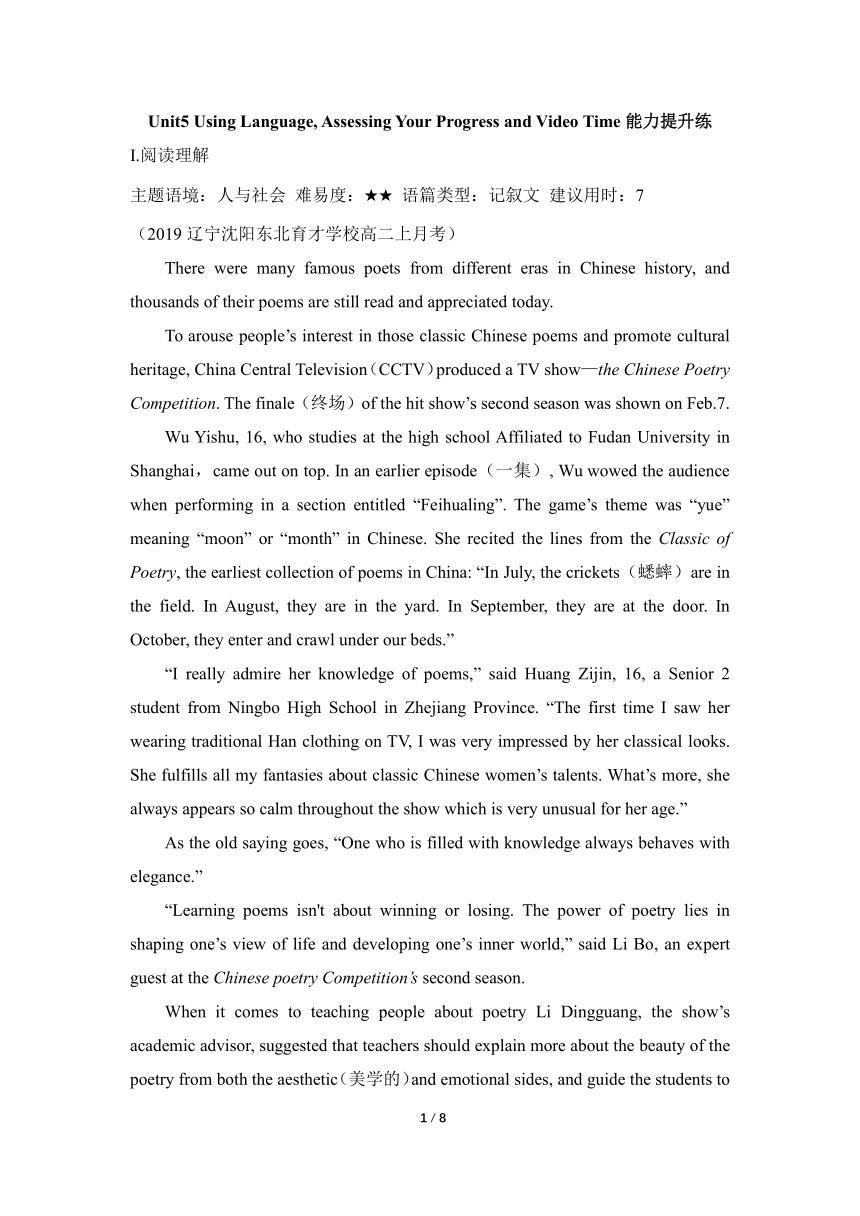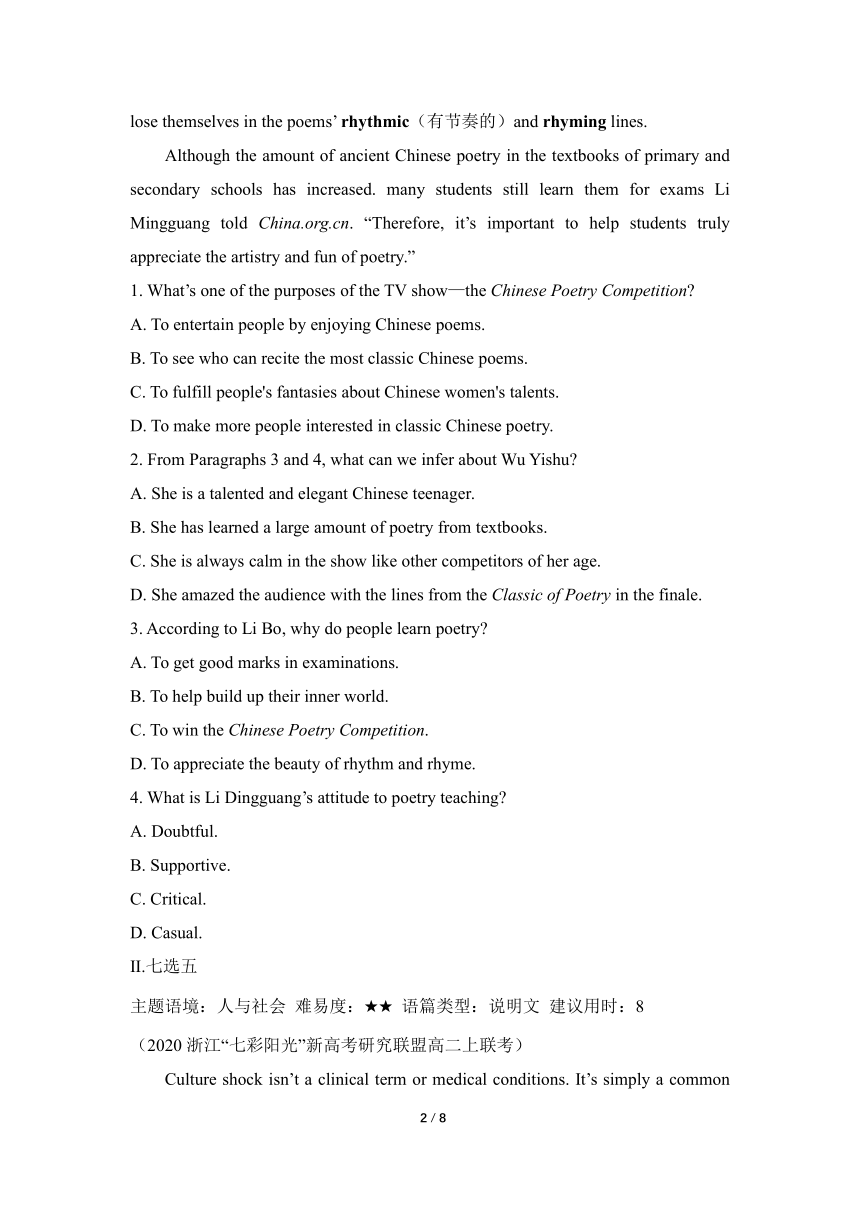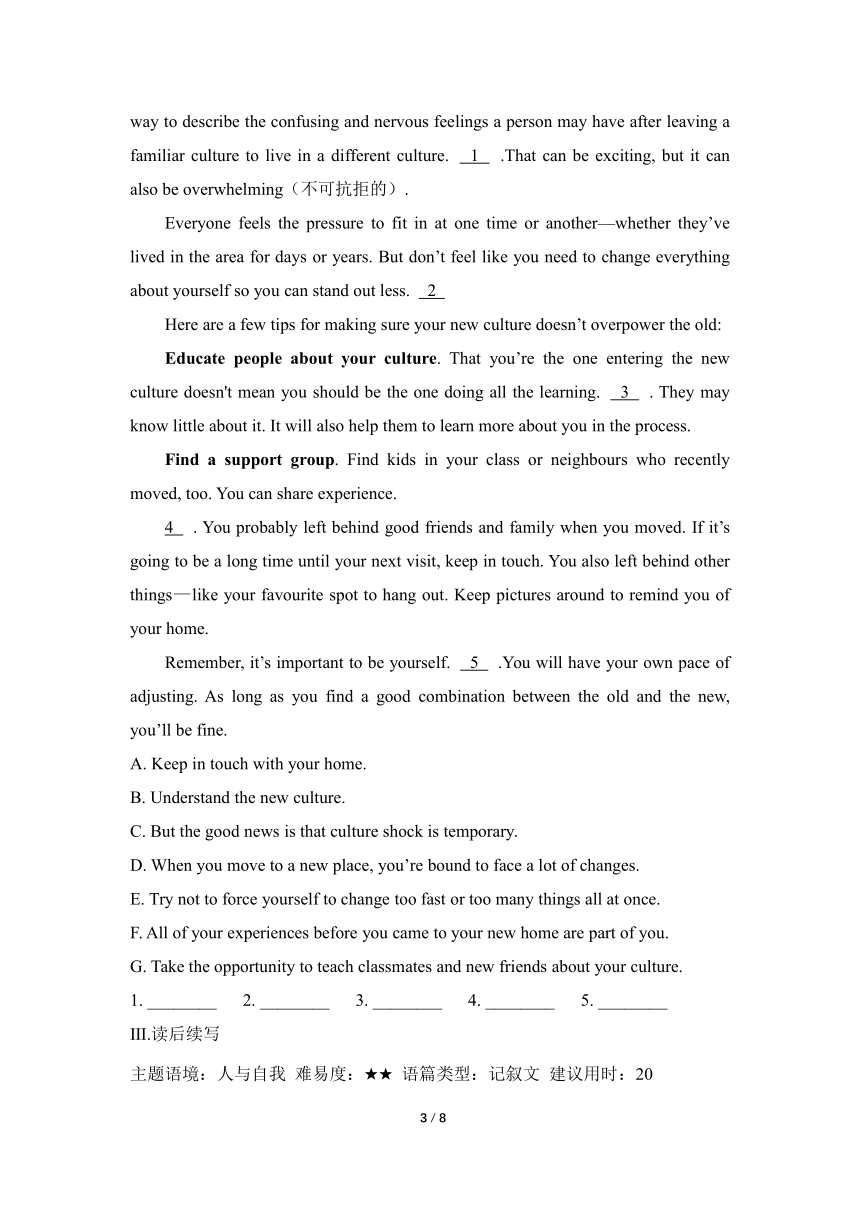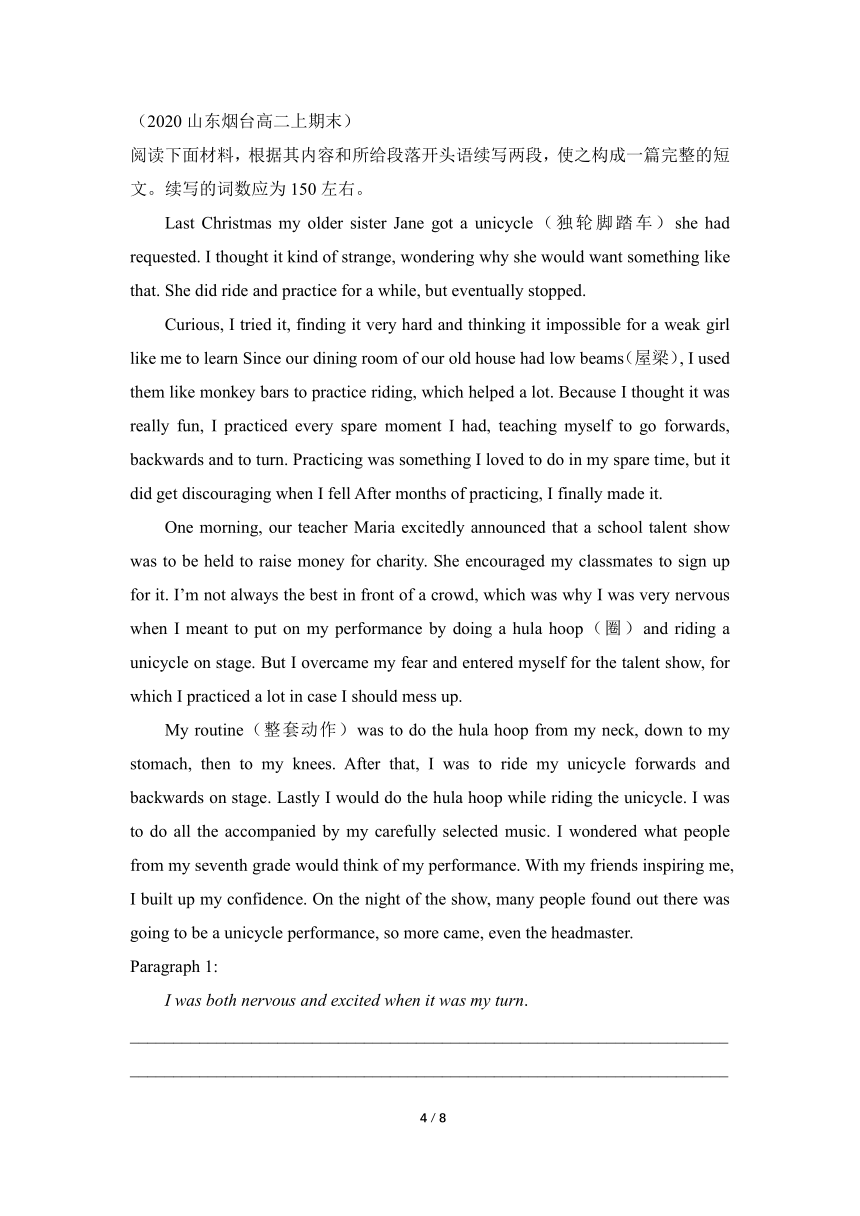选择性必修第三册 Unit5 PoemsUsing Language and Assessing Your Progress 能力提升练 (有解析)
文档属性
| 名称 | 选择性必修第三册 Unit5 PoemsUsing Language and Assessing Your Progress 能力提升练 (有解析) |  | |
| 格式 | docx | ||
| 文件大小 | 21.7KB | ||
| 资源类型 | 教案 | ||
| 版本资源 | 人教版(2019) | ||
| 科目 | 英语 | ||
| 更新时间 | 2023-03-13 22:36:23 | ||
图片预览




文档简介
Unit5 Using Language, Assessing Your Progress and Video Time能力提升练
I.阅读理解
主题语境:人与社会 难易度:★★ 语篇类型:记叙文 建议用时:7
(2019辽宁沈阳东北育才学校高二上月考)
There were many famous poets from different eras in Chinese history, and thousands of their poems are still read and appreciated today.
To arouse people’s interest in those classic Chinese poems and promote cultural heritage, China Central Television(CCTV)produced a TV show—the Chinese Poetry Competition. The finale(终场)of the hit show’s second season was shown on Feb.7.
Wu Yishu, 16, who studies at the high school Affiliated to Fudan University in Shanghai,came out on top. In an earlier episode(一集), Wu wowed the audience when performing in a section entitled “Feihualing”. The game’s theme was “yue” meaning “moon” or “month” in Chinese. She recited the lines from the Classic of Poetry, the earliest collection of poems in China: “In July, the crickets(蟋蟀)are in the field. In August, they are in the yard. In September, they are at the door. In October, they enter and crawl under our beds.”
“I really admire her knowledge of poems,” said Huang Zijin, 16, a Senior 2 student from Ningbo High School in Zhejiang Province. “The first time I saw her wearing traditional Han clothing on TV, I was very impressed by her classical looks. She fulfills all my fantasies about classic Chinese women’s talents. What’s more, she always appears so calm throughout the show which is very unusual for her age.”
As the old saying goes, “One who is filled with knowledge always behaves with elegance.”
“Learning poems isn't about winning or losing. The power of poetry lies in shaping one’s view of life and developing one’s inner world,” said Li Bo, an expert guest at the Chinese poetry Competition’s second season.
When it comes to teaching people about poetry Li Dingguang, the show’s academic advisor, suggested that teachers should explain more about the beauty of the poetry from both the aesthetic(美学的)and emotional sides, and guide the students to lose themselves in the poems’ rhythmic(有节奏的)and rhyming lines.
Although the amount of ancient Chinese poetry in the textbooks of primary and secondary schools has increased. many students still learn them for exams Li Mingguang told China.. “Therefore, it’s important to help students truly appreciate the artistry and fun of poetry.”
1. What’s one of the purposes of the TV show—the Chinese Poetry Competition
A. To entertain people by enjoying Chinese poems.
B. To see who can recite the most classic Chinese poems.
C. To fulfill people's fantasies about Chinese women's talents.
D. To make more people interested in classic Chinese poetry.
2. From Paragraphs 3 and 4, what can we infer about Wu Yishu
A. She is a talented and elegant Chinese teenager.
B. She has learned a large amount of poetry from textbooks.
C. She is always calm in the show like other competitors of her age.
D. She amazed the audience with the lines from the Classic of Poetry in the finale.
3. According to Li Bo, why do people learn poetry
A. To get good marks in examinations.
B. To help build up their inner world.
C. To win the Chinese Poetry Competition.
D. To appreciate the beauty of rhythm and rhyme.
4. What is Li Dingguang’s attitude to poetry teaching
A. Doubtful.
B. Supportive.
C. Critical.
D. Casual.
Ⅱ.七选五
主题语境:人与社会 难易度:★★ 语篇类型:说明文 建议用时:8
(2020浙江“七彩阳光”新高考研究联盟高二上联考)
Culture shock isn’t a clinical term or medical conditions. It’s simply a common way to describe the confusing and nervous feelings a person may have after leaving a familiar culture to live in a different culture. 1 .That can be exciting, but it can also be overwhelming(不可抗拒的).
Everyone feels the pressure to fit in at one time or another—whether they’ve lived in the area for days or years. But don’t feel like you need to change everything about yourself so you can stand out less. 2
Here are a few tips for making sure your new culture doesn’t overpower the old:
Educate people about your culture. That you’re the one entering the new culture doesn't mean you should be the one doing all the learning. 3 . They may know little about it. It will also help them to learn more about you in the process.
Find a support group. Find kids in your class or neighbours who recently moved, too. You can share experience.
4 . You probably left behind good friends and family when you moved. If it’s going to be a long time until your next visit, keep in touch. You also left behind other things—like your favourite spot to hang out. Keep pictures around to remind you of your home.
Remember, it’s important to be yourself. 5 .You will have your own pace of adjusting. As long as you find a good combination between the old and the new, you’ll be fine.
A. Keep in touch with your home.
B. Understand the new culture.
C. But the good news is that culture shock is temporary.
D. When you move to a new place, you’re bound to face a lot of changes.
E. Try not to force yourself to change too fast or too many things all at once.
F. All of your experiences before you came to your new home are part of you.
G. Take the opportunity to teach classmates and new friends about your culture.
1. ________ 2. ________ 3. ________ 4. ________ 5. ________
Ⅲ.读后续写
主题语境:人与自我 难易度:★★ 语篇类型:记叙文 建议用时:20
(2020山东烟台高二上期末)
阅读下面材料,根据其内容和所给段落开头语续写两段,使之构成一篇完整的短文。续写的词数应为150左右。
Last Christmas my older sister Jane got a unicycle(独轮脚踏车)she had requested. I thought it kind of strange, wondering why she would want something like that. She did ride and practice for a while, but eventually stopped.
Curious, I tried it, finding it very hard and thinking it impossible for a weak girl like me to learn Since our dining room of our old house had low beams(屋梁), I used them like monkey bars to practice riding, which helped a lot. Because I thought it was really fun, I practiced every spare moment I had, teaching myself to go forwards, backwards and to turn. Practicing was something I loved to do in my spare time, but it did get discouraging when I fell After months of practicing, I finally made it.
One morning, our teacher Maria excitedly announced that a school talent show was to be held to raise money for charity. She encouraged my classmates to sign up for it. I’m not always the best in front of a crowd, which was why I was very nervous when I meant to put on my performance by doing a hula hoop(圈)and riding a unicycle on stage. But I overcame my fear and entered myself for the talent show, for which I practiced a lot in case I should mess up.
My routine(整套动作)was to do the hula hoop from my neck, down to my stomach, then to my knees. After that, I was to ride my unicycle forwards and backwards on stage. Lastly I would do the hula hoop while riding the unicycle. I was to do all the accompanied by my carefully selected music. I wondered what people from my seventh grade would think of my performance. With my friends inspiring me, I built up my confidence. On the night of the show, many people found out there was going to be a unicycle performance, so more came, even the headmaster.
Paragraph 1:
I was both nervous and excited when it was my turn.
_______________________________________________________________________________________________________________________________________________________________________________________________________________
Paragraph 2:
When I got home, I couldn’t wait to check my mobile phone left at home.
_______________________________________________________________________________________________________________________________________________________________________________________________________________
参考答案:
I.语篇解读 本文是一篇记叙文。中国诗词源远流长,至今仍为世人传诵。为发扬中国文化,提高人们对中国古诗的兴趣,中央电视台制作并播出了《中国诗词大会》节目,中学生武亦姝以其特有的魅力征服了观众。
1.D【解析】细节理解题。根据第二段第一句中的 To arouse people’s interest in those classic Chinese poems and promote cultural heritage可知,中央电视台制作并播出《中国诗词大会》的目的是提高人们对中国古诗的兴趣、发扬中国文化,故D项正确。
2.A【解析】推理判断题。通读第三段可知,该段介绍了武亦姝以背诵含“月”字的诗词征服了观众;第四段介绍了人们对武亦姝气质和形象的评价:她穿着汉服、文静、内秀,给人们留下了深刻的印象。据此可以推断,武亦姝是一个有天赋的、优雅的青少年,故A项正确。
3.B【解析】细节理解题。根据第六段中的 The power of poetry lies in shaping one's view of life and developing ones inner world可知,郦波认为学习诗歌的目的在于塑造人的人生观和发展人的内心世界,故B项正确。
4.C【解析】推理判断题。根据最后一段中的 Although the amount of ancient Chinese poetry in the textbooks of primary and secondary schools has increased,many students still learn them for exams可知,李定广对学校诗歌教学的评价是:尽管教材中诗歌的数量增多了,但是许多学生学习诗歌仅仅是为了考试。据此可以判断,他对诗歌教学持批评态度,故C项正确。
【高频词汇】1. arouse v.激发;唤醒2. promote ν.提升;促进 3. wow v.使喝彩;博得……的称赞4. fulfill v.具备;实现;履行5. fantasy n.幻想6. Emotional adj.情感的7. artistry n.艺术技巧8. lie in在于
长难句分析
原句 When it comes to teaching people about poetry, Li Dingguang, the shows academic advisor, suggested that teachers should explain more about the beauty of the poetry from both the aesthetic and emotional sides and guide the students to lose themselves in the poems rhythmic and rhyming lines.
句意 涉及教人诗歌时,该节目的学术顾问李定广建议,教师应该从审美和情感两个方面多讲解诗歌的美,引导学生沉醉在诗歌的有节奏的和押韵的诗行中。
分析 本句为主从复合句。When it comes to teaching people about poetry为时间状语从句,When it comes to意为“提到/涉及……”; the show’s academic advisor为Li Mingguang的同位语;that teachers should explain more about the beauty of the poetry from both the aesthetic and emotional sides,and guide the students to lose themselves in the poems' rhythmic and rhyming lines 为宾语从句,作 suggested的宾语,且用了虚拟语气。
Ⅱ.语篇解读 本文是一篇说明文。主要介绍了不同的社会背景和文化差异等会造成文化冲击,并给出了缓解文化冲击的方法。
1.D【解析】根据下文 That can be exciting,but it can also be overwhelming可知,设空处表达的应是到了一个不同的文化背景下所面临的情况。D项 When you move to a new place you're bound to face a lot of changes符合文意,故选D项。
2.F【解析】根据前文,每个人在适应新环境时都会有压力,但是没必要改变一切来使你不那么引人注目,设空处应说明没有必要改变一切的原因,故F项 All of your experiences before you came to your new home are part of you符合题意,故选F项。
3.G【解析】根据上文,本段主旨为教育人们,让人们了解你的文化背景。关键词为 Educate。设空处前提到“你进入新的文化中并不意味着所有的东西都要由你来学”。再根据下文 They may know little about it.(他们可能对此了解甚少。)可知设空处应是让人们了解你的文化背景。故G项 Take the opportunity to teach classmates and new friends about your culture(利用这个机会向同学和新朋友讲授你们的文化)符合语境。关键词teach与 Educate相呼应,故选G项。
4.A【解析】根据下文,你搬家的时候可能会留下家人、朋友以及你喜欢的东西,所以要保持联系。关键词为 keep in touch。故A项 Keep in touch with your home(和家里保持联系)符合题意。故选A项。
5.E【解析】根据上文 Remember, it’s important to be yourself.可知,做自己很重要,设空处后又说要保持自己的调整步调,设空处应陈述没必要改变得太多、太快。故E项 Try not to force yourself to change too fast or too many things all at once(试着不要强迫自己突然改变得太快或改变太多东西)符合文意,故选E项。
长难句分析
原句 It’s simply a common way to describe the confusing and nervous feelings a person may have after leaving a familiar culture to live in a different culture.
句意 这只是描述一个人离开熟悉的文化后,生活在不同的文化中可能产生的困惑和紧张情绪的一种常见方式。
分析 本句主从复合句。主句为It’s simply a common way to describe the confusing and nervous feelings; a person may have after leaving a familiar culture to live in a different culture为定语从句,修饰先行词 feelings,省略了引导词that/which。
Ill. One possible version:
Paragraph 1:
I was both nervous and excited when it was my turn. I had a deep breath and then rode my unicycle towards the stage. When I heard the music, I started to put the hula hoop in my neck Carefully, I moved it down to my stomach. Everything seemed good. The audience applauded for me when the hula hoop was about to my knees. And then,an unlucky thing happened. I didn’t ride backwards firmly so I tumbled. At that moment I felt my heart was broken. However,after a very short rest, I stood up with my red face. I tried again and finally, I made it. Seeing this all the audience cheered and applauded happily.
Paragraph 2:
When I got home, I couldn’t wait to check my mobile phone left at home. My deskmate Mary sent the performance video to me and expressed that she was so proud of me. There were also many messages from my classmates and teachers, which encouraged me a lot. Not only could I challenge myself, but also I helped my school raise money for charity in this performance.
2 / 2
I.阅读理解
主题语境:人与社会 难易度:★★ 语篇类型:记叙文 建议用时:7
(2019辽宁沈阳东北育才学校高二上月考)
There were many famous poets from different eras in Chinese history, and thousands of their poems are still read and appreciated today.
To arouse people’s interest in those classic Chinese poems and promote cultural heritage, China Central Television(CCTV)produced a TV show—the Chinese Poetry Competition. The finale(终场)of the hit show’s second season was shown on Feb.7.
Wu Yishu, 16, who studies at the high school Affiliated to Fudan University in Shanghai,came out on top. In an earlier episode(一集), Wu wowed the audience when performing in a section entitled “Feihualing”. The game’s theme was “yue” meaning “moon” or “month” in Chinese. She recited the lines from the Classic of Poetry, the earliest collection of poems in China: “In July, the crickets(蟋蟀)are in the field. In August, they are in the yard. In September, they are at the door. In October, they enter and crawl under our beds.”
“I really admire her knowledge of poems,” said Huang Zijin, 16, a Senior 2 student from Ningbo High School in Zhejiang Province. “The first time I saw her wearing traditional Han clothing on TV, I was very impressed by her classical looks. She fulfills all my fantasies about classic Chinese women’s talents. What’s more, she always appears so calm throughout the show which is very unusual for her age.”
As the old saying goes, “One who is filled with knowledge always behaves with elegance.”
“Learning poems isn't about winning or losing. The power of poetry lies in shaping one’s view of life and developing one’s inner world,” said Li Bo, an expert guest at the Chinese poetry Competition’s second season.
When it comes to teaching people about poetry Li Dingguang, the show’s academic advisor, suggested that teachers should explain more about the beauty of the poetry from both the aesthetic(美学的)and emotional sides, and guide the students to lose themselves in the poems’ rhythmic(有节奏的)and rhyming lines.
Although the amount of ancient Chinese poetry in the textbooks of primary and secondary schools has increased. many students still learn them for exams Li Mingguang told China.. “Therefore, it’s important to help students truly appreciate the artistry and fun of poetry.”
1. What’s one of the purposes of the TV show—the Chinese Poetry Competition
A. To entertain people by enjoying Chinese poems.
B. To see who can recite the most classic Chinese poems.
C. To fulfill people's fantasies about Chinese women's talents.
D. To make more people interested in classic Chinese poetry.
2. From Paragraphs 3 and 4, what can we infer about Wu Yishu
A. She is a talented and elegant Chinese teenager.
B. She has learned a large amount of poetry from textbooks.
C. She is always calm in the show like other competitors of her age.
D. She amazed the audience with the lines from the Classic of Poetry in the finale.
3. According to Li Bo, why do people learn poetry
A. To get good marks in examinations.
B. To help build up their inner world.
C. To win the Chinese Poetry Competition.
D. To appreciate the beauty of rhythm and rhyme.
4. What is Li Dingguang’s attitude to poetry teaching
A. Doubtful.
B. Supportive.
C. Critical.
D. Casual.
Ⅱ.七选五
主题语境:人与社会 难易度:★★ 语篇类型:说明文 建议用时:8
(2020浙江“七彩阳光”新高考研究联盟高二上联考)
Culture shock isn’t a clinical term or medical conditions. It’s simply a common way to describe the confusing and nervous feelings a person may have after leaving a familiar culture to live in a different culture. 1 .That can be exciting, but it can also be overwhelming(不可抗拒的).
Everyone feels the pressure to fit in at one time or another—whether they’ve lived in the area for days or years. But don’t feel like you need to change everything about yourself so you can stand out less. 2
Here are a few tips for making sure your new culture doesn’t overpower the old:
Educate people about your culture. That you’re the one entering the new culture doesn't mean you should be the one doing all the learning. 3 . They may know little about it. It will also help them to learn more about you in the process.
Find a support group. Find kids in your class or neighbours who recently moved, too. You can share experience.
4 . You probably left behind good friends and family when you moved. If it’s going to be a long time until your next visit, keep in touch. You also left behind other things—like your favourite spot to hang out. Keep pictures around to remind you of your home.
Remember, it’s important to be yourself. 5 .You will have your own pace of adjusting. As long as you find a good combination between the old and the new, you’ll be fine.
A. Keep in touch with your home.
B. Understand the new culture.
C. But the good news is that culture shock is temporary.
D. When you move to a new place, you’re bound to face a lot of changes.
E. Try not to force yourself to change too fast or too many things all at once.
F. All of your experiences before you came to your new home are part of you.
G. Take the opportunity to teach classmates and new friends about your culture.
1. ________ 2. ________ 3. ________ 4. ________ 5. ________
Ⅲ.读后续写
主题语境:人与自我 难易度:★★ 语篇类型:记叙文 建议用时:20
(2020山东烟台高二上期末)
阅读下面材料,根据其内容和所给段落开头语续写两段,使之构成一篇完整的短文。续写的词数应为150左右。
Last Christmas my older sister Jane got a unicycle(独轮脚踏车)she had requested. I thought it kind of strange, wondering why she would want something like that. She did ride and practice for a while, but eventually stopped.
Curious, I tried it, finding it very hard and thinking it impossible for a weak girl like me to learn Since our dining room of our old house had low beams(屋梁), I used them like monkey bars to practice riding, which helped a lot. Because I thought it was really fun, I practiced every spare moment I had, teaching myself to go forwards, backwards and to turn. Practicing was something I loved to do in my spare time, but it did get discouraging when I fell After months of practicing, I finally made it.
One morning, our teacher Maria excitedly announced that a school talent show was to be held to raise money for charity. She encouraged my classmates to sign up for it. I’m not always the best in front of a crowd, which was why I was very nervous when I meant to put on my performance by doing a hula hoop(圈)and riding a unicycle on stage. But I overcame my fear and entered myself for the talent show, for which I practiced a lot in case I should mess up.
My routine(整套动作)was to do the hula hoop from my neck, down to my stomach, then to my knees. After that, I was to ride my unicycle forwards and backwards on stage. Lastly I would do the hula hoop while riding the unicycle. I was to do all the accompanied by my carefully selected music. I wondered what people from my seventh grade would think of my performance. With my friends inspiring me, I built up my confidence. On the night of the show, many people found out there was going to be a unicycle performance, so more came, even the headmaster.
Paragraph 1:
I was both nervous and excited when it was my turn.
_______________________________________________________________________________________________________________________________________________________________________________________________________________
Paragraph 2:
When I got home, I couldn’t wait to check my mobile phone left at home.
_______________________________________________________________________________________________________________________________________________________________________________________________________________
参考答案:
I.语篇解读 本文是一篇记叙文。中国诗词源远流长,至今仍为世人传诵。为发扬中国文化,提高人们对中国古诗的兴趣,中央电视台制作并播出了《中国诗词大会》节目,中学生武亦姝以其特有的魅力征服了观众。
1.D【解析】细节理解题。根据第二段第一句中的 To arouse people’s interest in those classic Chinese poems and promote cultural heritage可知,中央电视台制作并播出《中国诗词大会》的目的是提高人们对中国古诗的兴趣、发扬中国文化,故D项正确。
2.A【解析】推理判断题。通读第三段可知,该段介绍了武亦姝以背诵含“月”字的诗词征服了观众;第四段介绍了人们对武亦姝气质和形象的评价:她穿着汉服、文静、内秀,给人们留下了深刻的印象。据此可以推断,武亦姝是一个有天赋的、优雅的青少年,故A项正确。
3.B【解析】细节理解题。根据第六段中的 The power of poetry lies in shaping one's view of life and developing ones inner world可知,郦波认为学习诗歌的目的在于塑造人的人生观和发展人的内心世界,故B项正确。
4.C【解析】推理判断题。根据最后一段中的 Although the amount of ancient Chinese poetry in the textbooks of primary and secondary schools has increased,many students still learn them for exams可知,李定广对学校诗歌教学的评价是:尽管教材中诗歌的数量增多了,但是许多学生学习诗歌仅仅是为了考试。据此可以判断,他对诗歌教学持批评态度,故C项正确。
【高频词汇】1. arouse v.激发;唤醒2. promote ν.提升;促进 3. wow v.使喝彩;博得……的称赞4. fulfill v.具备;实现;履行5. fantasy n.幻想6. Emotional adj.情感的7. artistry n.艺术技巧8. lie in在于
长难句分析
原句 When it comes to teaching people about poetry, Li Dingguang, the shows academic advisor, suggested that teachers should explain more about the beauty of the poetry from both the aesthetic and emotional sides and guide the students to lose themselves in the poems rhythmic and rhyming lines.
句意 涉及教人诗歌时,该节目的学术顾问李定广建议,教师应该从审美和情感两个方面多讲解诗歌的美,引导学生沉醉在诗歌的有节奏的和押韵的诗行中。
分析 本句为主从复合句。When it comes to teaching people about poetry为时间状语从句,When it comes to意为“提到/涉及……”; the show’s academic advisor为Li Mingguang的同位语;that teachers should explain more about the beauty of the poetry from both the aesthetic and emotional sides,and guide the students to lose themselves in the poems' rhythmic and rhyming lines 为宾语从句,作 suggested的宾语,且用了虚拟语气。
Ⅱ.语篇解读 本文是一篇说明文。主要介绍了不同的社会背景和文化差异等会造成文化冲击,并给出了缓解文化冲击的方法。
1.D【解析】根据下文 That can be exciting,but it can also be overwhelming可知,设空处表达的应是到了一个不同的文化背景下所面临的情况。D项 When you move to a new place you're bound to face a lot of changes符合文意,故选D项。
2.F【解析】根据前文,每个人在适应新环境时都会有压力,但是没必要改变一切来使你不那么引人注目,设空处应说明没有必要改变一切的原因,故F项 All of your experiences before you came to your new home are part of you符合题意,故选F项。
3.G【解析】根据上文,本段主旨为教育人们,让人们了解你的文化背景。关键词为 Educate。设空处前提到“你进入新的文化中并不意味着所有的东西都要由你来学”。再根据下文 They may know little about it.(他们可能对此了解甚少。)可知设空处应是让人们了解你的文化背景。故G项 Take the opportunity to teach classmates and new friends about your culture(利用这个机会向同学和新朋友讲授你们的文化)符合语境。关键词teach与 Educate相呼应,故选G项。
4.A【解析】根据下文,你搬家的时候可能会留下家人、朋友以及你喜欢的东西,所以要保持联系。关键词为 keep in touch。故A项 Keep in touch with your home(和家里保持联系)符合题意。故选A项。
5.E【解析】根据上文 Remember, it’s important to be yourself.可知,做自己很重要,设空处后又说要保持自己的调整步调,设空处应陈述没必要改变得太多、太快。故E项 Try not to force yourself to change too fast or too many things all at once(试着不要强迫自己突然改变得太快或改变太多东西)符合文意,故选E项。
长难句分析
原句 It’s simply a common way to describe the confusing and nervous feelings a person may have after leaving a familiar culture to live in a different culture.
句意 这只是描述一个人离开熟悉的文化后,生活在不同的文化中可能产生的困惑和紧张情绪的一种常见方式。
分析 本句主从复合句。主句为It’s simply a common way to describe the confusing and nervous feelings; a person may have after leaving a familiar culture to live in a different culture为定语从句,修饰先行词 feelings,省略了引导词that/which。
Ill. One possible version:
Paragraph 1:
I was both nervous and excited when it was my turn. I had a deep breath and then rode my unicycle towards the stage. When I heard the music, I started to put the hula hoop in my neck Carefully, I moved it down to my stomach. Everything seemed good. The audience applauded for me when the hula hoop was about to my knees. And then,an unlucky thing happened. I didn’t ride backwards firmly so I tumbled. At that moment I felt my heart was broken. However,after a very short rest, I stood up with my red face. I tried again and finally, I made it. Seeing this all the audience cheered and applauded happily.
Paragraph 2:
When I got home, I couldn’t wait to check my mobile phone left at home. My deskmate Mary sent the performance video to me and expressed that she was so proud of me. There were also many messages from my classmates and teachers, which encouraged me a lot. Not only could I challenge myself, but also I helped my school raise money for charity in this performance.
2 / 2
